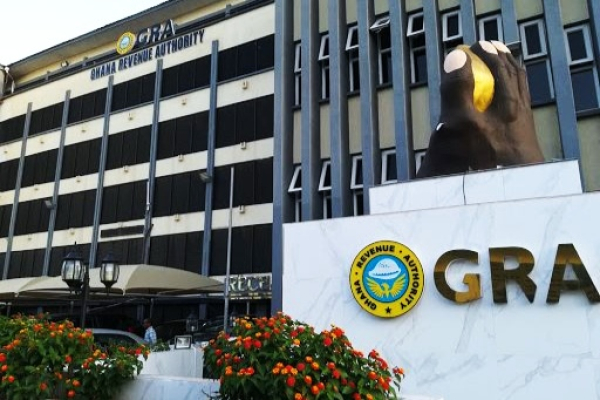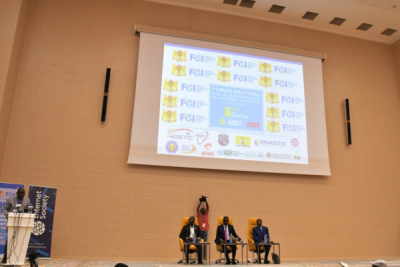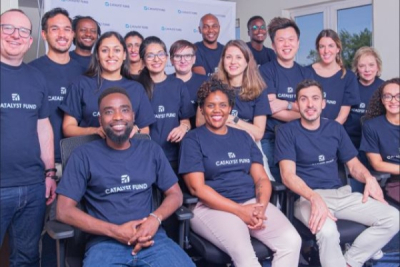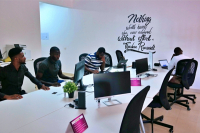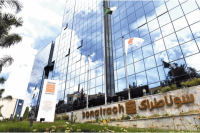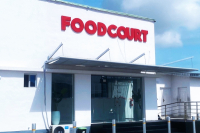Numerous African governments are now recognizing digitization as a pivotal driver of development. Consequently, they are actively aiming to utilize this technology to expedite their countries' progress and enhance the welfare of their citizens.
On September 8, Ghana and the Republic of South Korea signed a $2.2 million grant to bolster domestic revenue collection. The agreement was signed in Accra by Mr. John Ampontuah Kumah, representing the Ghanaian government, and the Country Director of the Korea International Cooperation Agency (KOICA), Mr. Dong Hyun Lee.
The partnership aims to establish a comprehensive master plan to modernize Ghana's tax systems and integrate them into digital structures, including Mobile Money (MoMo) platforms. It will be executed by the Ministry of Finance and the Ghana Revenue Authority (GRA) and will focus on building the capacities of revenue and tax officials. In addition to capacity building, it will also involve consultations to expand the Value Added Tax and income tax bases using the MoMo transactions database and promote e-invoicing for increased transparency in cross-border commercial transactions.
The implementation of the master plan is expected to have a lasting positive impact on the livelihoods of Ghanaians and contribute to the long-term transformation of the national economy.
Speaking at the agreement signing ceremony, Mr. Kumah expressed confidence in the master plan's potential to broaden Ghana's tax base and boost domestic revenue mobilization. This partnership represents “the tangible efforts and collaboration between two nations to improve the lives of our citizens and contribute to the sustainable development of Ghana,” he said.
Mr. Dong Hyun Lee underscored the role of tax revenues in driving socio-economic development. In that regard, he emphasized the need for robust institutional frameworks to ensure the effective implementation of the master plan, which will be customized to meet Ghana’s unique requirements in collaboration between Korean and Ghanaian tax experts.
Hikmatu Bilali
Between September 4 and 7, We Are Tech carried out an online survey into how users feel about the ongoing digitization trend in Africa, their uses, and their expectations. This survey provides interesting insights.
We want an innovative administration!
Administration is the first sector in which We Are Tech Africa’s survey respondents expect the most innovations to facilitate their daily lives and improve governance in their countries. Their second concern is education. Then agriculture. Other sectors lag far behind.
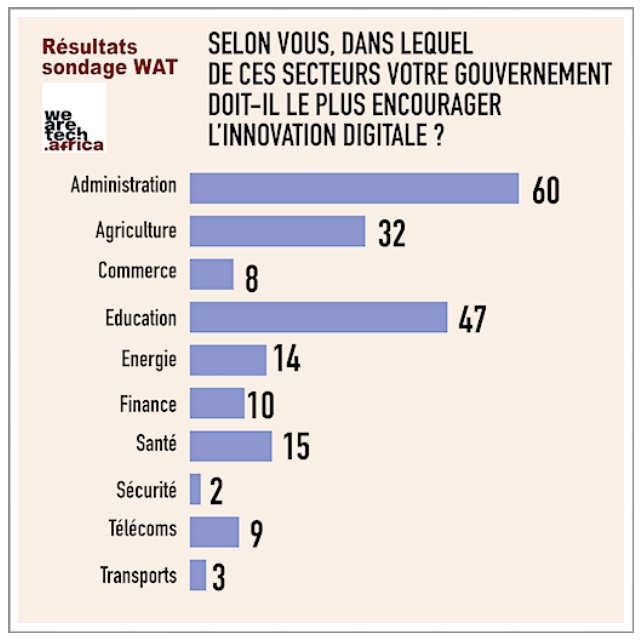
Evolving and diversified uses
When it comes to digital adoption, it's no surprise that social networks are the most widely used, followed by online media and financial services (mobile money and fintech). However, there has been a significant breakthrough in e-commerce, e-admin, e-education, and even artificial intelligence.
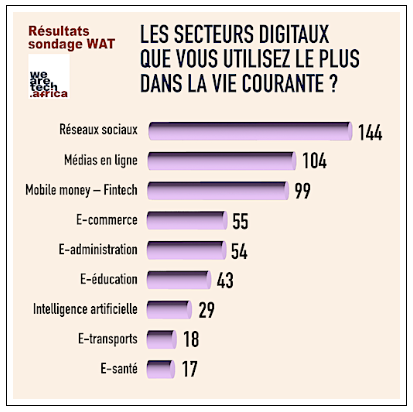
There are still obstacles to digitalization in Africa
According to respondents, the main obstacles to digitalization in Africa are high costs, poor connectivity, and a lack of promotion of new services.
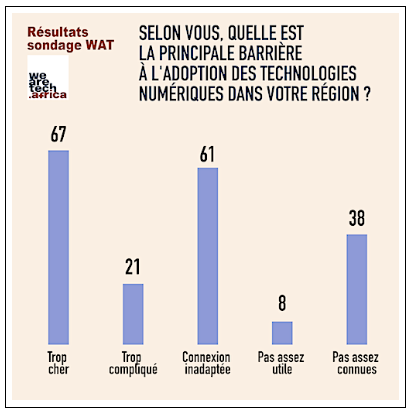
ChatGPT is getting into daily habits
Of the respondents, 39% claim to use the OpenAI service, while 8% even claim to use it daily.
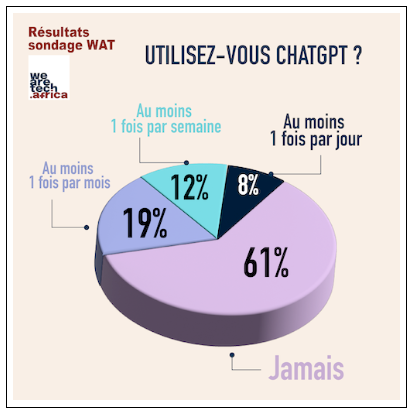
Cryptos remain attractive
While 63% of Internet users believe that cryptocurrencies are of no interest to them, 9% already own a wallet and 25% are considering opening one.
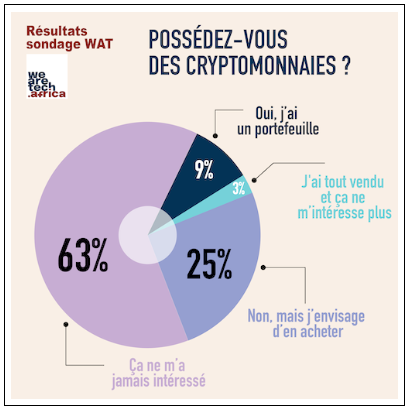
The 7th edition of the Internet Governance Forum-Chad (IGF -Chad) will be held on Saturday, September 16 in N'djamena under the theme "Quality of service (QoS) of mobile networks in Chad and the consumer experience: measurement and improvement".
As in previous years, participants will discuss issues and opportunities linked to the responsible and secure use of the Internet in the country.
Twende Hub is a community of innovators working together to solve concrete problems. It has already led to the development of several technologies and prototypes.
Twende Hub is a social innovation center that works to solve community problems through technology. Based in Tanzania, it provides workspace, technology incubation, and mentoring.
The center believes in working with students and community members to identify common challenges and design and create suitable solutions to those problems. Under the leadership of John Rexford Nzira, a project management and HR professional, it offers programs that encourage creativity and innovative thinking.
Its training programs are typically one day to eight weeks long. They are open to a variety of participants, from primary school pupils to community members. Through those programs, the center introduces participants to mechanical and electrical trades and thought processes that help them identify challenges facing them, their families, and their communities.
At the end of the programs, the center encourages “the more enthusiastic innovators with the most promising prototypes to take them forward towards a product which can be manufactured at scale, distributed, sold, serviced and used for the mutual benefit of everyone concerned and to contribute to the growth of the Tanzanian economy and poverty alleviation.”
Twende Hub has two creative spaces, workshops in which program participants can build their prototypes. One of these spaces is at its Arusha headquarters, while the other is located at the Orkolili secondary school and vocational training center in the Kilimanjaro region.
In its 9 years of existence, the center has helped develop over 60 prototypes and 20 technological products. More than 100,000 people use the technologies designed and developed by its trainees.
A member of the AfriLabs network, the center is supported by Google for Nonprofits, Kumasi Hive, Africa Open Science Hardware, Global Giving, Southern Africa Innovation Support, Pangea Advisors, The School of St Jude, and Okoa New Generation, among others.
Melchior Koba
Although she studied finance and actuarial sciences, she decided to pursue an entrepreneurial career in the transport industry. She now harnesses the power of technology to boost the industry in Kenya.
Balqis Chepkwony (photo) is a Kenyan-born tech entrepreneur and finance professional. She graduated from the University of Nairobi, in 2006, with a Bachelor's in Actuarial Science. The same year, she became a Chartered Professional Accountant after three years of study at the Vision Institute of Professionals.
The tech entrepreneur is better known as the CEO and co-founder of FleetSimplify, a startup offering fleet management solutions to revolutionize Kenya's transportation industry. Through FleetSimplify, launched in 2017, she develops innovative solutions that optimize transport, streamline operations, and improve the customer experience.
FleetSimplify is a car rental marketplace that connects drivers to quality cars for rent. It manages car rental, ensuring car owners are well paid and their cars are well maintained. And, to professional drivers, it allows instant access to cars that they can operate, as chauffeurs, to earn a decent living.
Balqis Chepkwony, the CEO overseeing its operations, entered the professional world in 2007. That year, she joined the energy company Hass Petroleum as an accountant. She left the company in 2014 and, the following year, she was hired by Texas Energy, as the chief financial officer. Her innovation and leadership have won her several awards and recognitions. She was one of seven finalists in the Pitch competition organized by Mobility 54 Investment SAS, the venture capital subsidiary of Toyota Tsusho Corporation and CFAO SAS, in May 2022. Her company was also selected, by Google for Startups, for the Black Founders Fund program in June 2023.
In August 2023, she was featured in Google Africa's WomeninIT series, which highlights women who are making significant contributions to their respective industries through technology.
Melchior Koba
Greentech startups are rapidly emerging in Africa with firm conviction that new technologies will play a key role in supporting sustainable development on the continent.
Catalyst Fund, a private equity fund investing in early-stage, climate-focused startups in Africa, has reached the first closing of its $40 million fund. Last Wednesday, the fund announced a first closing, at $8.6 million, with support from investors like FSD Africa Investments (FSDAi), the Cisco Foundation, USAID (Prosper Africa), and technology investor Andrew Bredenkamp.
The Kenya-based fund, headed by French impact investor Maelis Carraro, plans to invest in around 40 start-ups, including 20 this year. Eligible companies will receive funding of up to $200,000 for pre-seed startups, $500,000 for seed-stage companies, and $1.5 million in Series A financing for more mature companies.
“By blending equity investments with hands-on venture building, we believe we can unlock tremendous potential for innovative companies on the continent. Supporting ventures at the pre-seed stage requires more than capital. Our venture builders are the engineers, data scientists, and growth marketing experts who can supercharge founders’ journeys toward building scalable and highly impactful ventures," says Maelis Carraro.
Climate change is a global reality but Africa is the continent most vulnerable to its adverse effects despite contributing just 3% of global carbon emissions. It is therefore important to invest in startups that are active in the fight against climate change on the continent. According to a report published, in February 2023, by technology business accelerator AfricArena, such startups raised a total of $1.17 billion in 2022, of which $863 million was invested in capital.
By strategically focusing on solutions in agri-tech and fisheries management, food systems, insurtech and climate fintech, cold chain, waste management, and water management, Catalyst Fund aims to accelerate sustainable green growth. It will focus on solutions that can enable communities to better prepare for and manage shocks, adapt livelihoods to climate impacts, and build long-term resilience.
Samira Njoya
The center embodies the promise of a bright technological future for The Gambia. With its unwavering commitment to innovation, education, and collaboration, it is positioned as a major player in the African technology landscape.
In Gambia, The Disruptive Lab stands out as an important driver for innovation and technological development for young people. It offers a dynamic coworking space, providing not only a collaborative workplace, but also state-of-the-art equipment, networking opportunities, and an ambitious vision for the future of Gambian entrepreneurs and startups.
Founded in 2019, this innovative center is an initiative of Innovate Gambia, a movement to drive digital transformation and accelerate economic development in The Gambia. It is funded by PointClick Technologies, a cloud services company headed by Malik Khan.
Equipped with the latest software and hardware technologies, the center's workspace includes 3D printers, virtual reality headsets, game consoles, PDAs, digital whiteboards, unified communications, and collaboration technologies.
It aims to foster collaboration, forge a strong community, encourage innovation, and promote learning. Doing so, it plans on becoming a catalyst for change and transformation through innovation and digital technology.
To achieve its mission, The Disruptive Lab offers a diverse range of services and programs for its members and the general public. In addition to its coworking spaces, it provides entrepreneurs with conference and meeting rooms. It also organizes regular events and meetings to promote learning, networking, and collaboration.
One of its programs is DRILL, a six-month acceleration program that provides 60 selected companies with skills, business tools, and capital to support their growth in The Gambia and Tanzania. This initiative is carried out in partnership with Tanzania's Westerwelle Startup Haus Arusha, and is sponsored by AfriLabs and Digital Africa's capacity-building programs.
The Disruptive Lab does not limit itself to its internal activities. It has created a major networking event entitled "Who is Who in Tech in the Gambian Diaspora", aimed at connecting tech industry professionals from the diaspora with the local tech ecosystem. It's a bridge between global experience and local potential.
As a member of the AfriLabs network, The Disruptive Lab is supported by leading organizations such as Google for Startups, MailChimp, Amazon Web Services and QuickBooks.
Melchior Koba
Last week, Nigerian crypto company Nestcoin announced the completion of a $1.9 million funding round. The proceeds from this round will help set up Onboard Wallet, a non-custodial crypto wallet that will enable users to transfer funds directly to a bank account without going through a centralized exchange.
On Sunday, September 10, Algerian hydrocarbons company Sonatrach announced the launch of "SPEAKUP", a national platform to report and deal with internal corruption.
According to the company's press release, "SPEAKUP" enables employees, partners, customers, and other stakeholders to securely report serious illegal or illicit acts that violate enforceable laws and regulations, as well as violations of Sonatrach's anti-corruption policy and code of conduct.
Founded in 2021, it quickly found itself in the spotlight with its participation in the summer cohort of a major accelerator program. Since then, the startup has been growing at an accelerated pace.
FoodCourt is a digital solution developed by a Nigerian startup. It enables users to order food online from several restaurants and have it delivered to their home or office. The Lagos-based startup behind the solution was founded in 2021 by Henry Nneji and Paul Adokiye Iruene.
“Consumer behavior is changing in Africa, and despite the rise of food delivery aggregator apps like Jumia Foods and Glovo, there is still a massive amount of inefficiency in the food delivery space. We realized that all customers really wanted was good food and a seamless ordering experience,” explained Henry Nneji on the reasons that promoted the creation of FoodCourt.
The solution has a mobile app –For Android and iOS devices– through which a user can create an account to start placing orders. The app lists several restaurants offering a variety of food. It also allows users to group orders. With its cashless policy, no cash payment is accepted. Payments can be made only via dematerialized payment methods such as digital wallets, bank cards, or bank transfers.
"The delivery fee is determined by the distance between you & the restaurant. Our delivery fees currently go from 390 – 850 naira & may increase as much as 1.5x during a surge. Surges are caused by irregular factors like heavy traffic, heavy rainfall, fuel scarcity, high order volumes at the restaurant, etc.," says FoodCourt concerning its delivery fees.
According to Play Store data, the Android version of its mobile app has already been downloaded more than 50,000 times. In 2022, FoodCourt was selected to participate in the summer cohort of Californian accelerator Y Combinator. The startup wants to conquer Nigeria, expand to other countries in Africa, and even go beyond the continent.
Adoni Conrad Quenum
More...
With a diverse educational background and a wealth of experience in the technology industry, Jennie Nwokoye is on a mission to transform primary healthcare services in Africa.
Nigerian-born tech entrepreneur Jennie Nwokoye (photo) is the founder and CEO of Clafiya, a startup that is revolutionizing access to primary healthcare by offering convenient, high-quality, and affordable services directly from users' cell phones.
Founded in 2021, Clafiya uses cutting-edge Google Maps Platform technology to enable patients to quickly locate the nearest healthcare providers. This innovative initiative offers patients the option of using USSD (Unstructured Supplementary Service Data) codes or the Clafiya web app to register and schedule face-to-face consultations with nurses and community health workers. As a result, patients receive an accurate diagnosis and treatment recommendations tailored to their needs.
Jennie Nwokoye, the CEO overseeing the operations of this innovative startup, has an impressive and diverse educational background. In 2012, she earned a bachelor's in biomedical sciences, with a minor in anthropology, at the University of Florida. Her thirst for knowledge then led her to earn a master's in medical science and technology at Stevenson University in 2015. Finally, in 2021, she earned a PhD in Systems Engineering at George Washington University.
Her professional career, spanning more than 10 years, started at Procter & Gamble in 2013, in the USA, where she worked as an analytical chemist. She then broadened her horizons by working with prestigious international and government institutions, including as an Intelligence Operations Specialist for the US Department of Homeland Security from 2016 to 2017, and as a Program Manager at Amazon Web Services in 2020-2021.
Jennie Nwokoye's dedication and innovative approach have not gone unnoticed. In 2020, she was honored as the recipient of the Legacy Lab Foundation Fellowship by Team One. The following year, Forbes named her in the “Health and Science” category of its Next 1000 list, which showcases “ambitious sole proprietors [...] who are redefining what it means to build and run a business.” In 2022, her startup, Clafiya, took part in the prestigious Google for Startups Accelerator Africa program.
Beyond her entrepreneurial successes, Jennie Nwokoye is deeply committed to supporting the next generation of entrepreneurs. As a mentor in the Washington-based incubator Halcyon, she has made a significant impact by helping more than a dozen young entrepreneurs raise over $200,000 since 2019.
Melchior Koba
Despite SMEs making up the majority of businesses in developing countries, their engagement in international trade is limited compared to their economic importance. However, the emergence of the digital economy could create new opportunities for SMEs to actively participate in global economic networks.
Korea Technopark Association (KTPA) and the International Trade Centre (ITC) have signed a Letter of Intent to drive the digital transformation of small and medium-sized enterprises (SMEs) in developing countries. The partnership was announced in a press release issued by the ITC on Tuesday, September 5. This strategic partnership, with an initial focus on Kenya, seeks to foster innovation, facilitate technology transfer, and enhance small business capabilities.
In response to the challenges posed by the fourth industrial revolution, this collaboration will leverage the 'Korea Technopark Operational Model' (K-TP Model), serving as an innovative ecosystem. The model will promote cooperation among government entities, industries, research institutions, and academia.
The Letter of Intent outlines various initiatives, including the establishment of Technoparks in developing countries, the strengthening of innovation and technology ecosystems, and the creation of connections between Korean organizations and businesses in these regions.
The primary objective of this partnership, supported by the Ministry of SMEs and Startups of the Republic of Korea, is to support the digital transformation of Kenyan manufacturing SMEs, thereby enhancing Kenya's industrial innovation.
Youngjib Kim, Chairman of the Korea Technopark Association, expressed enthusiasm for the partnership, highlighting KTPA's commitment to fostering innovative ecosystems for manufacturing SMEs in developing nations and contributing to the Sustainable Development Goals.
The collaboration between KTPA and ITC represents a significant step toward promoting technological advancement and economic growth in developing countries through targeted digital transformation initiatives for SMEs.
Hikmatu Bilali
Internet for all is a major development challenge for East African countries. Despite the ambitions stated in national development plans, several countries are struggling to provide better connectivity for their populations. Setting up a joint project could provide a solution to that challenge.
The East African Community (EAC) will be launching an Eastern Africa Regional Digital Integration Project (EA-RDIP 2023-2028) in the coming months. Daniel Murenzi, CAE's Senior ICT Officer, announced the 10th edition of the East African Internet Governance Forum (EA-IGF), held on Tuesday, September 5, in Kigali, Rwanda. The project aims to meet the connectivity needs of countries in the Horn of Africa.
"The Eastern Africa Regional Digital Integration Project is in response to the discussions and recommendations of the 9th East Africa Internet Governance Forum and aims to drive digital market integration by expanding broadband connectivity and improving the digital service environment," said Daniel Murenzi.
The five-year World Bank-backed project aligns with regional priorities, focusing on the need to bridge the digital divide, reduce connectivity costs, and empower marginalized groups such as youth, people with disabilities, and women. The aim is to boost access to broadband and digital services, fostering the development and integration of digital markets in East Africa.
To achieve this goal, the EAC relies on the Internet and partnerships between member states. Strategies will be put in place to ensure that Internet access is affordable for all. In January, East Africa boasted 23.1% Internet penetration, benefiting 110.7 million people, equivalent to 8.4% of its population.
Once implemented, the project will support cross-border connectivity, data harmonization, e-commerce regulations and policies, and the removal of trade barriers, to establish a single digital market.
Samira Njoya
Since 2011, Congo has been served by a single international fiber subsea cable, the WACS. Frequent outages on this infrastructure disrupt Internet services.
On Thursday, September 7, the Congolese Minister of Posts, Telecommunications and the Digital Economy, Léon-Juste Ibombo, launched the construction of a second national backbone network, resulting from Congo's recent connection to the new 2Africa subsea cable.
The 2Africa subsea cable, initiated by Meta (Facebook's parent company), will enable data transmission between Pointe-Noire and Brazzaville at a very high speed of up to 10 gigabytes per second.
According to the Minister of Telecoms, the new network will improve and further strengthen the capacity of what already exists. "The construction of the new Matombi backbone network, which will serve Pointe-Noire, Brazzaville, and the other cities, is the concrete expression of a strong ambition to improve the speed and reliability of electronic communications, facilitate trade and access to international markets, foster technological innovation and encourage the emergence of startups, and strengthen Congo's participation in the global digital economy," he said.
2Africa is the second international subsea cable the Republic of Congo is connected to. In 2011, the country connected to the WACS (West Africa Cable System) cable, on which it mainly depends for broadband Internet services. However, frequent outages on this infrastructure cause disruption to Internet services.
When completed in 2024, the 2Africa cable will be 45,000 km long, making it the longest in the world. It will serve a geographical area (Africa, Middle East, Europe) home to some three billion people, or 36% of the world's population.
In Congo, 2Africa should not only reduce the cost of Internet services but also extend access to these services to millions more people. According to the latest data from the regulator, the country currently has 3.05 million Internet users, equivalent to a penetration rate of 54%.
Samira Njoya


